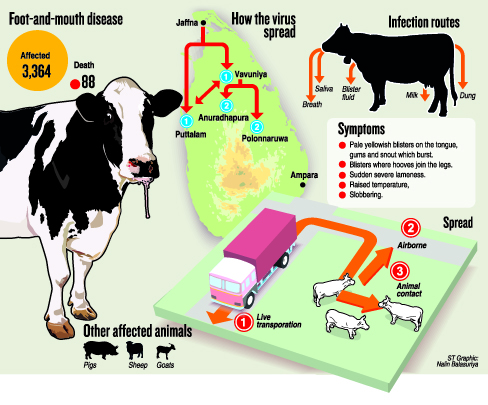News
Govt. meat ban to prevent ‘foot and mouth’ spread lacks cohesion
The Government’s decision to ban meat, except for poultry, in five selected districts, to prevent the spread of the ‘Foot and Mouth’ disease, has met with confusion among officials in different districts, who have adopted varying strategies in implementing the decision.
The gazette notification regarding the measures to be taken to prevent the spread of the disease, was issued by the Director General of Animal Health and Production.
In Addalachchenai, Ampara, meat stall owners engaged in heated debate with the police when they tried to close down the shops and confiscate the meat. According to the meat stall owners, they have not been informed by the veterinary department to immediately halt all slaughter of cattle, as per gazette notifications issued by the Dept of Animal Health and Production.
The ban has been imposed only in the affected areas within Ampara district, Uhana, Ampara and Samanthurai, said Dr T.K. Thawarajan, Provincial Director, Dept of Animal Health and Production.
On the contrary, all meat stalls and slaughterhouses have been closed, and all transportation of animals, cattle, goat and pig, has been prohibited within the entire Anuradapura district.
This is to curb any illegal transportation within and out of the district. “The district has many cattle transportation, and controlling movement of cattle would be difficult, if not for a total ban,” said Dr Nihal Wedasinghe, NCP Director, Dept of Animal Health and Production.
Vaccination has started in all the affected districts and farmers have been requested to isolate the infected animals from the rest of the herd.
The disease is suspected to have originated from a free roaming herd of cattle in one of the army camps in Palaly, Jaffna, which has not received routine vaccinations given by the Dept of Animal Health.
The disease spread to Puttalam and Vavuniya first due to illicit transportation of animals from the northern parts, and may not have been detected, as some farmers in these two districts do not routinely vaccinate their animals, said Dr W.K. De Silva, Director General of Animal Health and Production.
The disease which is endemic to the country, had existed in pockets in the Ampara District in previous years, and the Dept had already taken steps to control the situation before the major outbreak was reported.
No new cases have been reported since the first detection, and all the officials instructed on how to handle the situation.
However, there is still a threat of the disease spreading through cow-dung, which is transported from affected districts such as Anuradhapura and Vavuniya, to vegetable farms in Nuwara Eliya, Dr De Silva said.
Nuwara Eliya is the largest milk producing district in the country. Most of the large scale dairy farms which rear high yield cows are located in this district, and an outbreak of the ‘foot and mouth’ disease can seriously affect milk production in the country.
“It is important that people adhere to the regulations, to avoid this from spreading. If the rules are implemented properly, the disease will be controlled within the next two to three weeks,” Dr Silva said.
Milk collection within the affected districts has not been completely halted. The provincial directors in the Dept have been given the responsibility to decide whether or not to collect milk in the five districts.
The National Livestock and Development Board (NLDB) continues to collect milk from farms in the affected areas.


